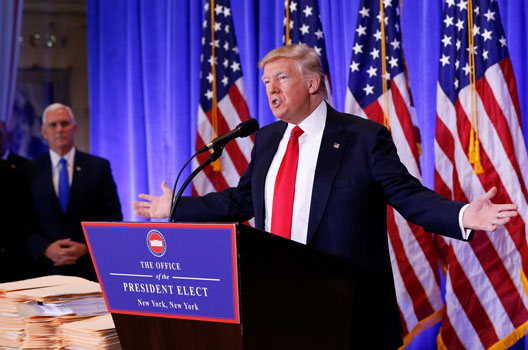 From the outset of his administration, US President-elect Donald Trump must develop a coherent foreign policy and national security strategy which establishes a clear US stance on the world stage, deters adversaries, and reassure allies, former Secretary of State Madeleine K. Albright said on January 10.
From the outset of his administration, US President-elect Donald Trump must develop a coherent foreign policy and national security strategy which establishes a clear US stance on the world stage, deters adversaries, and reassure allies, former Secretary of State Madeleine K. Albright said on January 10.
While acknowledging the value of a new perspective, Albright, who also serves as an Atlantic Council board member, said: “I hope that when [Trump] is president… he’s very clear about where America stands.”
“Long-term strategies matter,” said Damon Wilson, executive vice president of the Atlantic Council. Introducing an event at the United States Institute of Peace, co-hosted by the Atlantic Council, Wilson described the ongoing breakdown of the US-led, rules-based international order, and said that the United States is best positioned to meet these challenges as a global leader. Calling for bipartisan support of a foreign policy strategy, he said, “US success abroad is anchored in who we are at home.”
Asserting the need for a clear strategy from the new administration, Albright said that “we need to understand… foreign policy, national security policy does not come in four-year or eight-year segments, and no president comes in with a clean slate.”
Albright joined Sen. Tom Cotton (R-AR); Fred Kempe, president and Chief Executive Officer (CEO) of the Atlantic Council; and retired Adm. James Stavridis, dean of the Fletcher School at Tufts University, to discuss their top national security priorities. Martha Raddatz, chief global affairs correspondent for ABC News, moderated the conversation.
The panelists raised issues such as cybersecurity, great-power conflict, violent extremism, non-state actors, nuclear posturing, a revanchist Russia, North Korea’s nuclear development, the conflict in the Middle East, and China’s shifting stance on the world stage.
Ultimately, “the world is a mess,” said Albright. According to Kempe, the world “won’t become more orderly unless the United States steps in.”
“The United States, more than any other nation, is best prepared to navigate these challenges… and play a leading role to shape that future and a system consistent with our values,” said Wilson.
In light of these myriad threats, Cotton said the Trump administration must “take the initiative to set priorities that would fundamentally advantage the United States in strategic competition.” Considering security threats, Cotton called for reinvestment in the US nuclear program and increased defense spending, two areas addressed during Trump’s campaign.
While the panelists agreed on the need for the administration to communicate a strategy, Albright expressed concern over Trump’s policy pronouncements via Twitter which have caused unease among US allies. “Every administration tries to do things differently, but [the tweets] have created great concerns,” she said.
According to Kempe, “the tweets have to be accompanied by strategy.” He said that the “unpredictability that the president-elect has embraced” can be “useful in some situations, but on the global stage, the United States has to be predictable.”
Countries around the world are “frozen” in their understanding of where they stand with the future of US foreign policy, said Cotton. In particular, he added, “I don’t think there’s a clear signal being sent to Moscow right now from the Trump administration.”
“Most of our adversaries are scared of Donald Trump, to put it very bluntly,” said Cotton. According to Stavridis, that fear comes from the president-elect’s unpredictability. “Unpredictability, occasionally, is interesting,” said Albright, “constant unpredictability is dangerous.”
Cotton said he foresees a firmer line with adversaries and a greater strength emanating from the White House. Trump will be “less willing to make concessions without receiving concessions in return,” he said. “The key thing we can do is apply more pressure and gain the strategic upper hand.”
In light of the Kremlin’s aggression in Ukraine and recent cyberattack on the Democratic National Committee, Cotton said Trump should “greet Russia with firmer boundaries so they know costs will be imposed if they cross those boundaries.”
Stavridis echoed his call for an aggressive stance, saying, “there needs to be more confrontation… confront where we must, but cooperate where we can.”
Albright underscored the importance of allies, saying “I think we need to be tough while at the same time looking for areas [where] we can cooperate.” Though maintaining the United States is indispensable on the world stage, “there is nothing about indispensable that implies alone,” she added.
“We’ve got to have consistency and a view,” said Stavridis. “We should give [the new administration] time to develop it.”
While Kempe agreed that the United States must be clear about its relationships with allies and adversaries, he said “they have to start developing national security ideas with the inaugural.”
Rachel Ansley is an editorial assistant with the Atlantic Council.
Image: Vice President-elect Mike Pence (L) is seen in the background as US President-elect Donald Trump speaks during a press conference in Trump Tower, Manhattan, New York, US, January 11, 2017. (Reuters/Shannon Stapleton)
